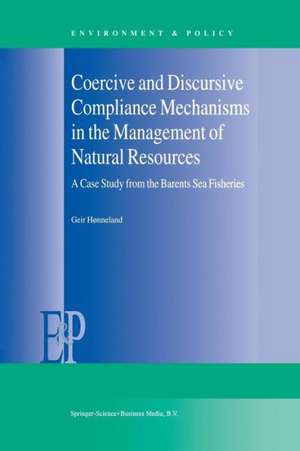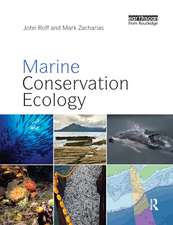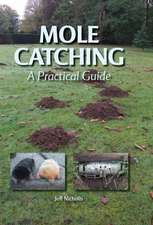Coercive and Discursive Compliance Mechanisms in the Management of Natural Resources: A Case Study from the Barents Sea Fisheries: Environment & Policy, cartea 23
Autor Geir Hønnelanden Limba Engleză Paperback – 9 oct 2012
| Toate formatele și edițiile | Preț | Express |
|---|---|---|
| Paperback (1) | 636.12 lei 6-8 săpt. | |
| SPRINGER NETHERLANDS – 9 oct 2012 | 636.12 lei 6-8 săpt. | |
| Hardback (1) | 642.51 lei 6-8 săpt. | |
| SPRINGER NETHERLANDS – 31 mai 2000 | 642.51 lei 6-8 săpt. |
Din seria Environment & Policy
- 18%
 Preț: 783.68 lei
Preț: 783.68 lei - 15%
 Preț: 641.20 lei
Preț: 641.20 lei -
 Preț: 402.78 lei
Preț: 402.78 lei -
 Preț: 407.01 lei
Preț: 407.01 lei - 15%
 Preț: 641.85 lei
Preț: 641.85 lei - 18%
 Preț: 955.08 lei
Preț: 955.08 lei - 18%
 Preț: 944.82 lei
Preț: 944.82 lei - 15%
 Preț: 650.19 lei
Preț: 650.19 lei - 18%
 Preț: 952.89 lei
Preț: 952.89 lei - 15%
 Preț: 642.68 lei
Preț: 642.68 lei - 18%
 Preț: 1227.36 lei
Preț: 1227.36 lei - 18%
 Preț: 1226.90 lei
Preț: 1226.90 lei - 15%
 Preț: 642.18 lei
Preț: 642.18 lei - 15%
 Preț: 641.53 lei
Preț: 641.53 lei - 15%
 Preț: 643.48 lei
Preț: 643.48 lei -
 Preț: 385.25 lei
Preț: 385.25 lei - 20%
 Preț: 335.52 lei
Preț: 335.52 lei - 15%
 Preț: 640.88 lei
Preț: 640.88 lei - 15%
 Preț: 638.43 lei
Preț: 638.43 lei - 18%
 Preț: 941.50 lei
Preț: 941.50 lei - 18%
 Preț: 946.55 lei
Preț: 946.55 lei - 18%
 Preț: 945.30 lei
Preț: 945.30 lei - 18%
 Preț: 948.29 lei
Preț: 948.29 lei - 18%
 Preț: 959.19 lei
Preț: 959.19 lei - 18%
 Preț: 957.44 lei
Preț: 957.44 lei - 18%
 Preț: 955.70 lei
Preț: 955.70 lei - 15%
 Preț: 639.90 lei
Preț: 639.90 lei
Preț: 636.12 lei
Preț vechi: 748.38 lei
-15% Nou
Puncte Express: 954
Preț estimativ în valută:
121.72€ • 127.10$ • 100.51£
121.72€ • 127.10$ • 100.51£
Carte tipărită la comandă
Livrare economică 15-29 aprilie
Preluare comenzi: 021 569.72.76
Specificații
ISBN-13: 9789401057837
ISBN-10: 9401057834
Pagini: 208
Ilustrații: XVI, 187 p.
Dimensiuni: 155 x 235 x 11 mm
Greutate: 0.3 kg
Ediția:2000
Editura: SPRINGER NETHERLANDS
Colecția Springer
Seria Environment & Policy
Locul publicării:Dordrecht, Netherlands
ISBN-10: 9401057834
Pagini: 208
Ilustrații: XVI, 187 p.
Dimensiuni: 155 x 235 x 11 mm
Greutate: 0.3 kg
Ediția:2000
Editura: SPRINGER NETHERLANDS
Colecția Springer
Seria Environment & Policy
Locul publicării:Dordrecht, Netherlands
Public țintă
ResearchCuprins
1 Introduction.- Theoretical context — the debate to be addressed.- Empirical background — the Barents Sea and its fishermen.- Empirical context — the issues to be raised.- Methodology.- the structure of the book.- 2 The Interaction of Research Programmes in Social Science Studies of the Commons.- Lakatos and scientific research programmes.- two traditions in the study of common-pool resources.- A Growing Literature on the Commons?.- Conclusion: scientific growth as interaction between theoretical traditions.- 3 A Model of Compliance in Fisheries — Theoretical Foundations and Practical Application.- Background: the study of compliance.- Sources of compliance.- first-order and management-induced compliance.- two compliance mechanisms: coercive and discursive measures.- Management levels and subsystems of compliance.- an agenda for research.- 4 The Barents sea Fisheries — Resources, Jurisdiction and Management.- The Barents Sea fish resources.- The fishing industries of Northern Norway and Northwestern Russia.- the legal setting.- Norway’s fishery relations with other states.- The Russian-Norwegian fishery management regime.- Norwegian fisheries management.- Russian fisheries management.- 5 Compliance in the Barents Sea — a Preliminary Discussion.- Fishing activity in the Barents Sea.- Violation rates in the Barents Sea fisheries.- Do violation rates reflect actual compliance?.- First-order compliance.- Compliance as a result of coercive measures.- “Indirect coercion” in the Svalbard Zone.- Legitimacy and discursive measures.- An observer’s account of co-operative action in the Svalbard Zone.- Conclusion.- 6 How Fishermen Account for Compliance.- The interview setting.- A positive attitude towards the coast guard.- Legitimate regulations andprocedures.- Partly illegitimate research results.- Strict enforcement.- Self-induced compliance.- Conclusion.- 7 Co-Management and Communities in the Barents sea Fisheries.- Theoretical revisit: co-management and communities.- Co-management in Northwest Russian fisheries.- Co-management in Norwegian fisheries.- The Barents Sea fishing communities.- Co-management and compliance.- Conclusion.- 8 Investigation Revisited.- Methodology revisited: the stories fishermen tell.- Hypotheses revisited: discourse or guns?.- Epistemological Context Revisited: Contributions to the Scientific Debate.- 9 Concluding Remarks.- Co-management beyond “user-group participation”.- Co-management — a system-centric perspective?.- Implications of the methodological and epistemological choices Made.- References.

















